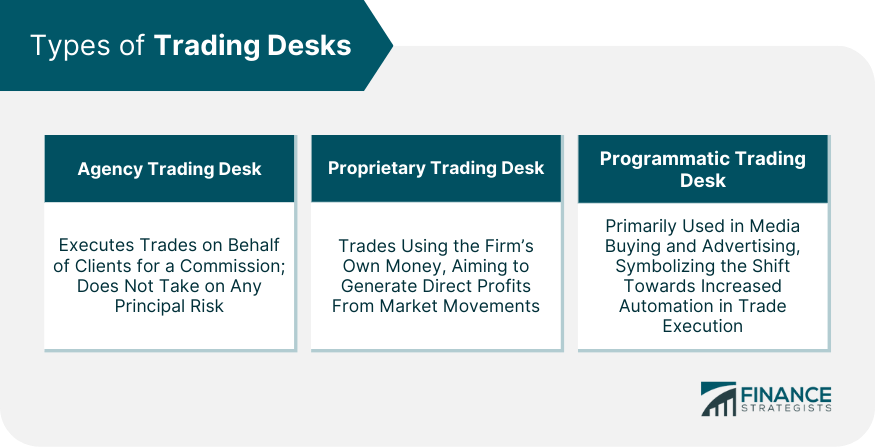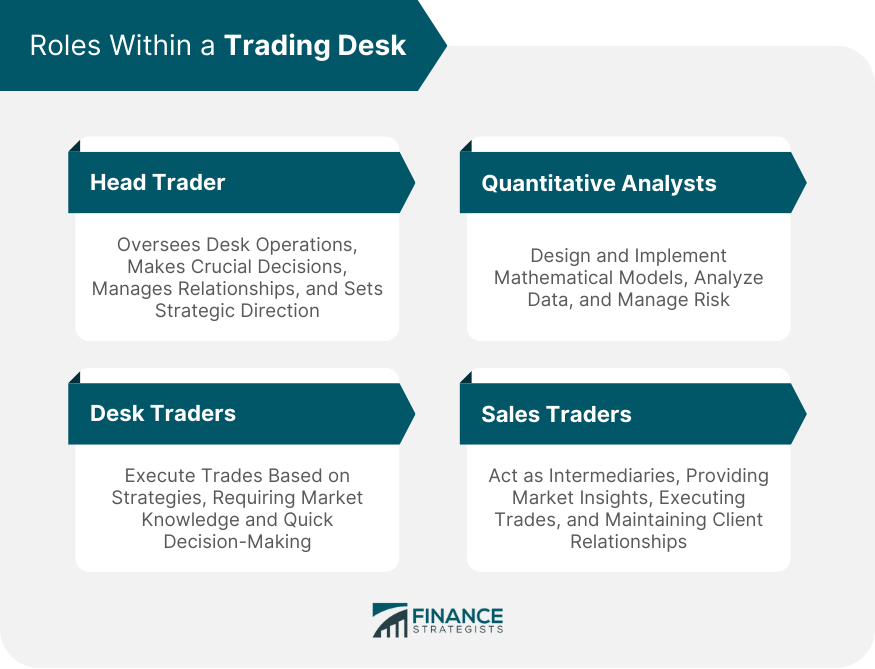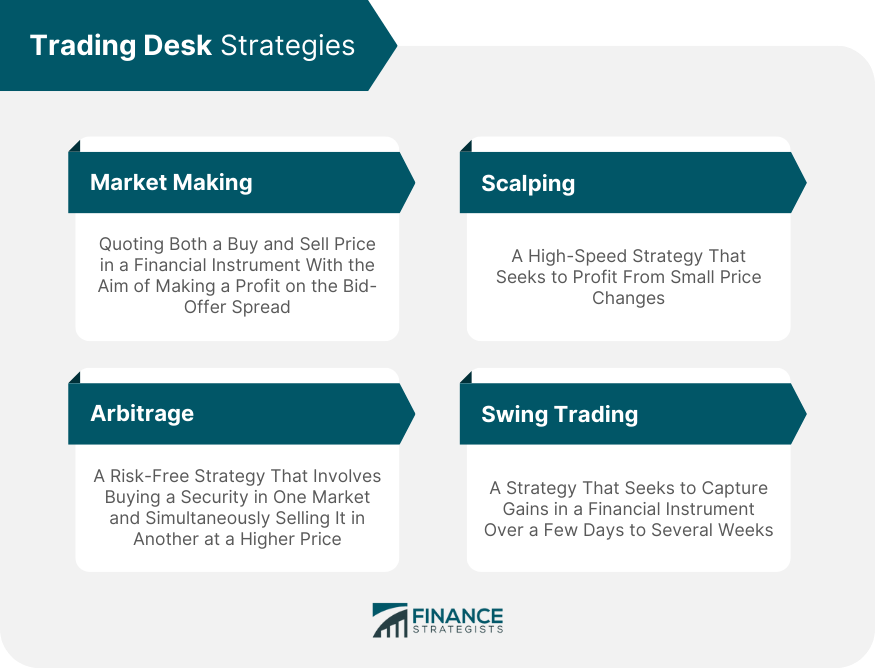Trading desks are specialized departments within financial institutions that execute securities transactions. Acting as the central hub for buying and selling activities, these desks engage in various forms of trading, from traditional stocks and bonds to more complex derivatives. There are different types of trading desks, including agency desks that trade on behalf of clients, and proprietary desks that trade using the firm's own money. The operations of trading desks involve a combination of human expertise and advanced technology, where traders work alongside algorithms and artificial intelligence to navigate market dynamics. These desks play a critical role in financial markets, aiding in price discovery, providing liquidity, and managing investment risk. Their roles have evolved significantly with technological advancements, making them integral to the modern global financial ecosystem. Agency trading desks operate as an intermediary between the buyer and the seller, executing trades on behalf of clients and earning a commission for their services. These desks do not take on any principal risk as they merely facilitate trades rather than holding positions. Proprietary trading desks, on the other hand, trade using the firm's own money instead of clients' funds, aiming to generate direct profits from market movements. This approach involves a greater level of risk as the firm stands to lose its own capital in case of adverse market events. Programmatic trading desks use advanced algorithms and real-time bidding to buy and sell ad inventory across multiple platforms. Although this term is mostly used in advertising and media buying, it's being adopted in financial trading too, symbolizing the transition towards increased automation in trade execution. At the helm of a trading desk is the head trader. This individual oversees the desk's operations, making crucial decisions about risk-taking, managing relationships with clients and regulators, and setting strategic direction. The foot soldiers of the trading desk, desk traders, execute trades as per the strategies devised by the head trader and the team. Their role demands deep understanding of market dynamics, keen attention to detail, and the ability to make quick decisions under pressure. Quantitative analysts, often called 'quants,' play a crucial role in designing and implementing the complex mathematical models that drive trading decisions. They employ advanced statistical techniques to analyze market data, devise trading strategies, and manage risk. Sales traders act as the link between the client and the trading desk, providing clients with market insights, and trade ideas, and executing trades on their behalf. They combine the roles of a salesperson and a trader, maintaining client relationships while also having a firm understanding of trading operations. The primary function of a trading desk is trade execution. Traders use a variety of methods, including manual trading, algorithmic trading, or high-frequency trading, to buy and sell securities as efficiently as possible. Trading desks manage several types of risk, including market risk, credit risk, and operational risk. Traders, along with risk management specialists, work together to identify, assess, and mitigate these risks to protect the firm's capital and reputation. In an increasingly regulated financial environment, ensuring compliance with rules and regulations is a critical part of trading desk operations. Compliance officers ensure that all trading activities adhere to regulatory requirements, thereby avoiding costly fines and reputational damage. is another vital aspect of trading desk operations. Traders and analysts need to provide regular reports to clients, senior management, and regulators. These reports typically include details about trade execution, performance, risk exposure, and compliance. Trading desks contribute to market liquidity by constantly buying and selling securities. This constant activity ensures that market participants can execute their trades quickly and at fair prices. Through their trading activities, trading desks play a crucial role in the process of price discovery. They help establish the prices at which supply and demand meet, contributing to the overall efficiency of financial markets. Trading desks can influence market volatility. While their trading activities generally contribute to market stability by providing liquidity and aiding price discovery, excessive speculative trading or high-frequency trading can sometimes exacerbate market volatility. Market making is a common strategy employed by trading desks. Market makers quote both a buy and a sell price in a financial instrument, hoping to make a profit on the bid-offer spread. By doing so, they provide liquidity to the market and ensure smoother and more efficient trading. is a risk-free trading strategy that involves buying a security in one market and simultaneously selling it in another market at a higher price. Trading desks use sophisticated technology to spot and exploit these arbitrage opportunities. Scalping is a high-speed trading strategy that aims to profit from small price changes. This strategy requires a strict exit strategy as a large loss could eliminate many small gains achieved. Swing trading is a strategy that attempts to capture gains in a stock (or any financial instrument) over a period of a few days to several weeks. Traders utilize technical analysis to look for stocks with short-term price momentum. Operate in a highly regulated environment. Regulations such as MiFID II in Europe and Dodd-Frank in the US impose stringent requirements on trading desks, ranging from transaction reporting to best execution. Complying with these regulations poses significant challenges for trading desks. They must keep up with the changing regulatory landscape, implement robust compliance systems, and train their staff to adhere to regulatory requirements. While regulations aim to protect investors and ensure market integrity, they also have profound implications for trading desk operations. They influence the way trades are executed, reported, and even how trading desks interact with their clients. Trading desks heavily rely on electronic trading systems to execute trades quickly and efficiently. These systems allow traders to access multiple exchanges and trade a wide range of securities from a single platform. They offer various functionalities such as real-time market data, algorithmic trading, risk management, and reporting tools. Algorithmic trading uses pre-programmed instructions to execute trades at speeds and frequencies that a human trader cannot match. This approach minimizes the impact of human emotions on trading decisions, improves execution speed, and can potentially enhance trading performance. A subset of algorithmic trading, high-frequency trading (HFT) involves executing thousands of trades within microseconds to take advantage of minute price discrepancies. While HFT has been a subject of debate due to concerns about market stability and fairness, it plays a significant role in providing liquidity and improving market efficiency. Artificial Intelligence (AI) is revolutionizing trading desk operations. AI can analyze vast amounts of data, identify patterns that humans cannot discern, and make trading decisions in real-time. Machine learning, a subset of AI, enables trading systems to learn from data and improve their performance over time without being explicitly programmed. Trading desks are specialized units within financial institutions, responsible for executing trades and managing investment risk. With divisions including agency, proprietary, and programmatic desks, they merge human expertise with advanced technology for optimal market navigation. Critical roles include head traders, desk traders, quantitative analysts, and sales traders. Alongside trade execution, trading desks focus on risk management, compliance, and reporting, utilizing electronic trading systems, algorithmic trading, and artificial intelligence. They maintain market fluidity, facilitate price discovery, and can influence market volatility. Compliance with regulations, like MiFID II and Dodd-Frank, is vital, leading to continuous adaptation in trading operations. Looking ahead, trading desks face significant changes with increased automation, AI integration, the impact of blockchain and cryptocurrencies, and the rise of sustainable trading, making them a dynamic element of the global financial system.What Are Trading Desks?
Types of Trading Desks
Agency Trading Desks
Proprietary Trading Desks
Programmatic Trading Desks

Structure and Roles Within a Trading Desk
Head Trader
Desk Traders
Quantitative Analysts
Sales Traders

Trading Desk Operations
Trade Execution
Risk Management
Compliance
Reporting
Role of Trading Desks in Financial Markets
Liquidity Provision
Price Discovery
Impact on Market Volatility
Trading Desk Strategies
Market Making
Arbitrage
Scalping
Swing Trading

Regulatory Environment for Trading Desks
Key Financial Regulations Affecting Trading Desks
Compliance Challenges for Trading Desks
Impact of Regulations on Trading Desk Operations
Technology Behind Trading Desks
Electronic Trading Systems
Algorithmic Trading
High-Frequency Trading
Artificial Intelligence in Trading Desks
Conclusion
Trading Desks FAQs
A Trading Desk is a specialized unit within a financial institution that executes trades in various securities. It serves as the nerve center for buying and selling activities, using both human expertise and advanced technology to navigate market dynamics. Trading Desks play a critical role in financial markets by facilitating price discovery, providing liquidity, and managing investment risks.
There are mainly three types of Trading Desks - Agency, Proprietary, and Programmatic. Agency Desks execute trades on behalf of clients for a commission. Proprietary Desks trade using the firm's money, aiming to generate direct profits. Programmatic Desks use sophisticated algorithms and real-time bidding for trade execution.
Trading Desks leverage a range of technologies including electronic trading systems for efficient trade execution, algorithmic trading for high-speed transactions, and artificial intelligence to analyze vast amounts of data and identify patterns. They also use machine learning to continuously improve trading strategies and risk management.
Trading Desks operate in a tightly regulated environment and need to adhere to financial regulations such as MiFID II in Europe and Dodd-Frank in the US. Compliance involves implementing robust systems, training staff, and keeping up-to-date with the ever-changing regulatory landscape. It also impacts how trades are executed, reported, and how trading desks interact with clients.
The future of Trading Desks will be shaped by increased automation and AI, the integration of blockchain and cryptocurrencies, and the rising trend of sustainable and socially responsible trading. Advances in technology will lead to more sophisticated trading strategies and better risk management, while sustainability considerations will become increasingly integrated into trading decisions.
True Tamplin is a published author, public speaker, CEO of UpDigital, and founder of Finance Strategists.
True is a Certified Educator in Personal Finance (CEPF®), author of The Handy Financial Ratios Guide, a member of the Society for Advancing Business Editing and Writing, contributes to his financial education site, Finance Strategists, and has spoken to various financial communities such as the CFA Institute, as well as university students like his Alma mater, Biola University, where he received a bachelor of science in business and data analytics.
To learn more about True, visit his personal website or view his author profiles on Amazon, Nasdaq and Forbes.











